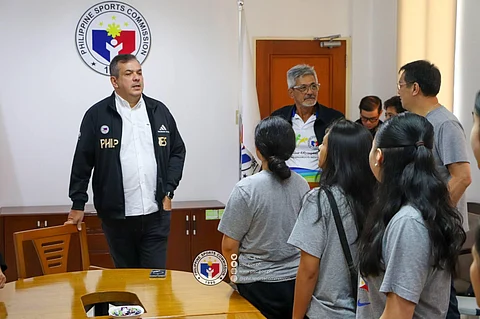
- NEWS
- the EDIT
- COMMENTARY
- BUSINESS
- LIFE
- SHOW
- ACTION
- GLOBAL GOALS
- SNAPS
- DYARYO TIRADA
- MORE

Memories came flashing back when Philippine Sports Commission (PSC) chairman Richard “Dickie” Bachmann witnessed Gilas Pilipinas beat a European team in a major international competition for the first time in 64 years.
For some, it was just a landmark victory.
But for Bachmann, it’s a realization of a dream.
Bachmann said seeing Gilas Pilipinas beat Latvia, 89-80, in the FIBA Olympic Qualifying Tournament in Riga is a dream-come-true since his father was a member of the last Philippine team that beat a European powerhouse via an 84-82 win over Spain in the Rome Olympics in 1960.
“Even with the Asian Games, my father was the last team to win the gold medal. I’m kind of bittersweet but I’m proud of my dad and I’m proud of what he has accomplished,” Bachmann said.
Bachmann tried to take the path trailed by his distinguished father.
The 6-foot-5 Bachmann played for De La Salle University from 1986 to 1991 and was drafted eighth by Alaska in the Philippine Basketball Association (PBA) Rookie Draft behind collegiate superstars Jun Limpot, Victor Pablo and Johnny Abarrientos.
He had a short playing career with the Milkmen, but made a name as its assistant coach and team manager as well as the trusted guy of Alaska team owner Fred Uytengsu.
When Alaska folded up, he served as commissioner of the University Athletic Association of the Philippines and the PBA 3x3 tourney that paved the way for him to become the chief of the local organizing body when the country hosted the FIBA Basketball World Cup last year in 2023.
But he was no longer in the position when the World Cup kicked off last August.
President Ferdinand “Bongbong” Marcos appointed him as chairman of the PSC in December of 2022, making him the most powerful sports executive in the government.
Bachmann admitted that although he is celebrating the win, he also has to be neutral since he is now attending to the needs of all Filipino athletes.
“It’s a prestigious event and something that he would also hope for me, but at least now, in this capacity, I’m there also but for all our athletes in different sports,” Bachmann said, adding that being appointed as PSC chief came as a pleasant surprise.
“Well, I was in the middle of the FIBA World Cup. I was in charge of operations, but when this task came along, I knew that I have no experience in government,” he said.
“I come from the private sector. I knew that I would be taken, but when I left for the States with the family, I got the job.”
Bachmann said upon his appointment, the first number to call was that of his older brother — Philippine Squash Academy president Robert Bachmann.
“I’ll admit, I did ask my brother for help because he has experience in an NSA (national sports association). He dealt with the POC (Philippine Olympic Committee) and with PSC.”
“I talked to former chairman and former commissioners. Chito Loyzaga was a commissioner as well as my manager from La Salle, Freddy Mendoza.”
Bachmann said he doesn’t want to just stand by and do nothing as he wants to lend his experience in helping out athletes.
“I didn’t come in empty-handed. I was ready. Again, I just felt it’s about time that I fix everything in PSC,” Bachmann said.
“I asked how deeply they wanted me to fix it. If it’s going to be status quo, I’m not interested. I think our athletes deserve better.”
Under his watch, the PSC made huge strides, including the renovation of facilities at the Philsports Complex in Pasig City and the Rizal Memorial Baseball Stadium in Manila.
He said he was able to do these because he would always use the facilities to know the things that needed to be fixed.
“I try to use the facilities and take advantage. I do play tennis and soft tennis. Recently, I tried paddling with my kids,” Bachmann said.
“It’s an easier way to check out facilities and do the sports. My brother plays squash. I also used to play squash, so I actually play.”
The morale of the athletes is now also high.
In the 32nd Southeast Asian Games, Filipino athletes collected 58 gold medals while they took home four mints in the 19th Asian Games, one of the best finishes of Team Philippines in recent memory.
Now, the PSC is preparing to fund more than 20 athletes who will see action in the Paris Olympics, where another gold medal is expected in various sports like boxing, athletics and weightlifting.
“We take care of the facilities. We collaborate with, communicate with the NSA on what we’re doing with the facility,” Bachmann said.
“So they’re appreciative of that. PSC supports more of their training here or abroad.”
True enough, Bachmann had been very successful in his new career as sports administrator.
He may have failed to match or surpass the feats set by his legendary father inside the hardcourt, but he had achieved some milestones that made him truly special.
Indeed, the son had already risen.
